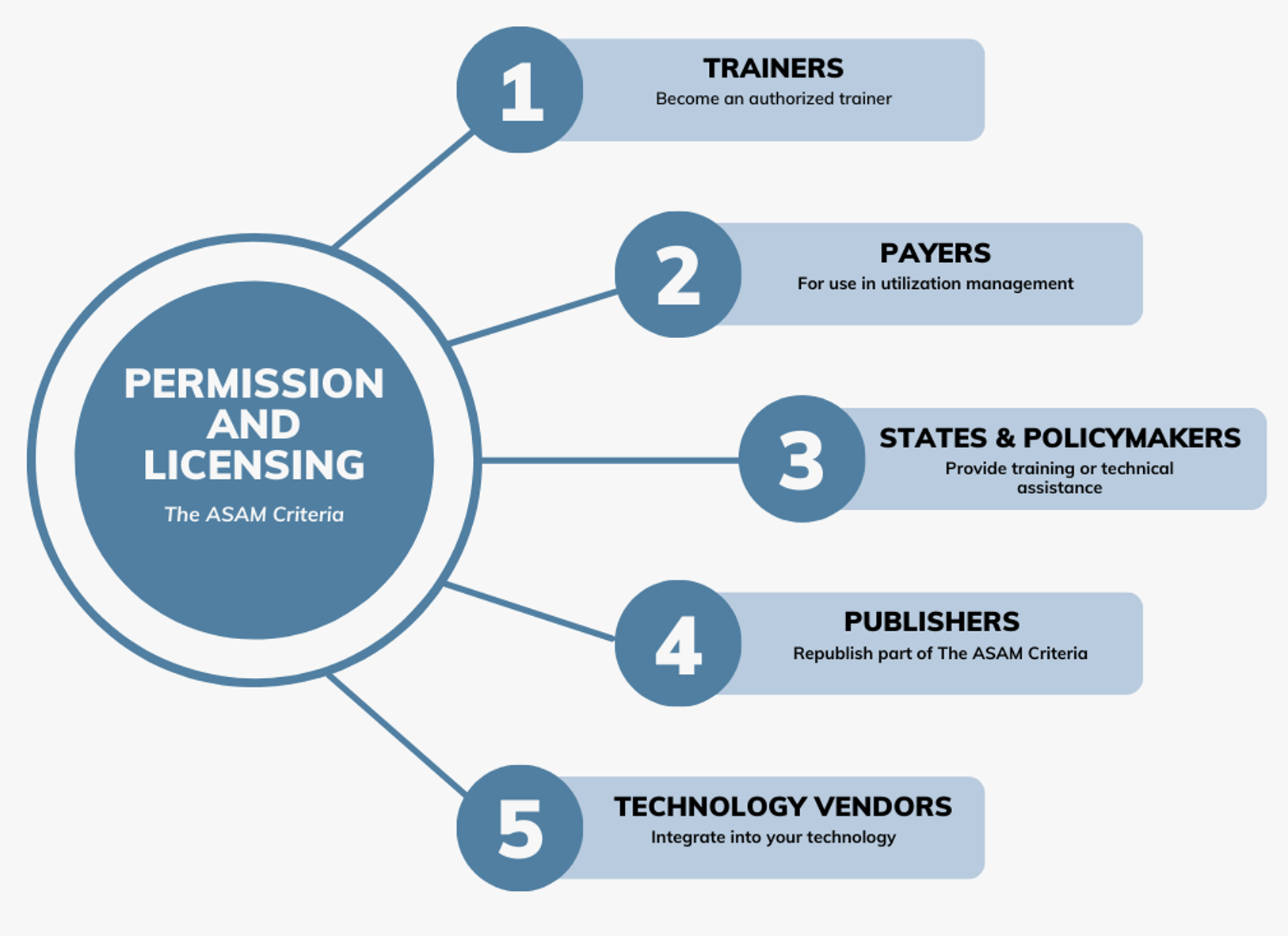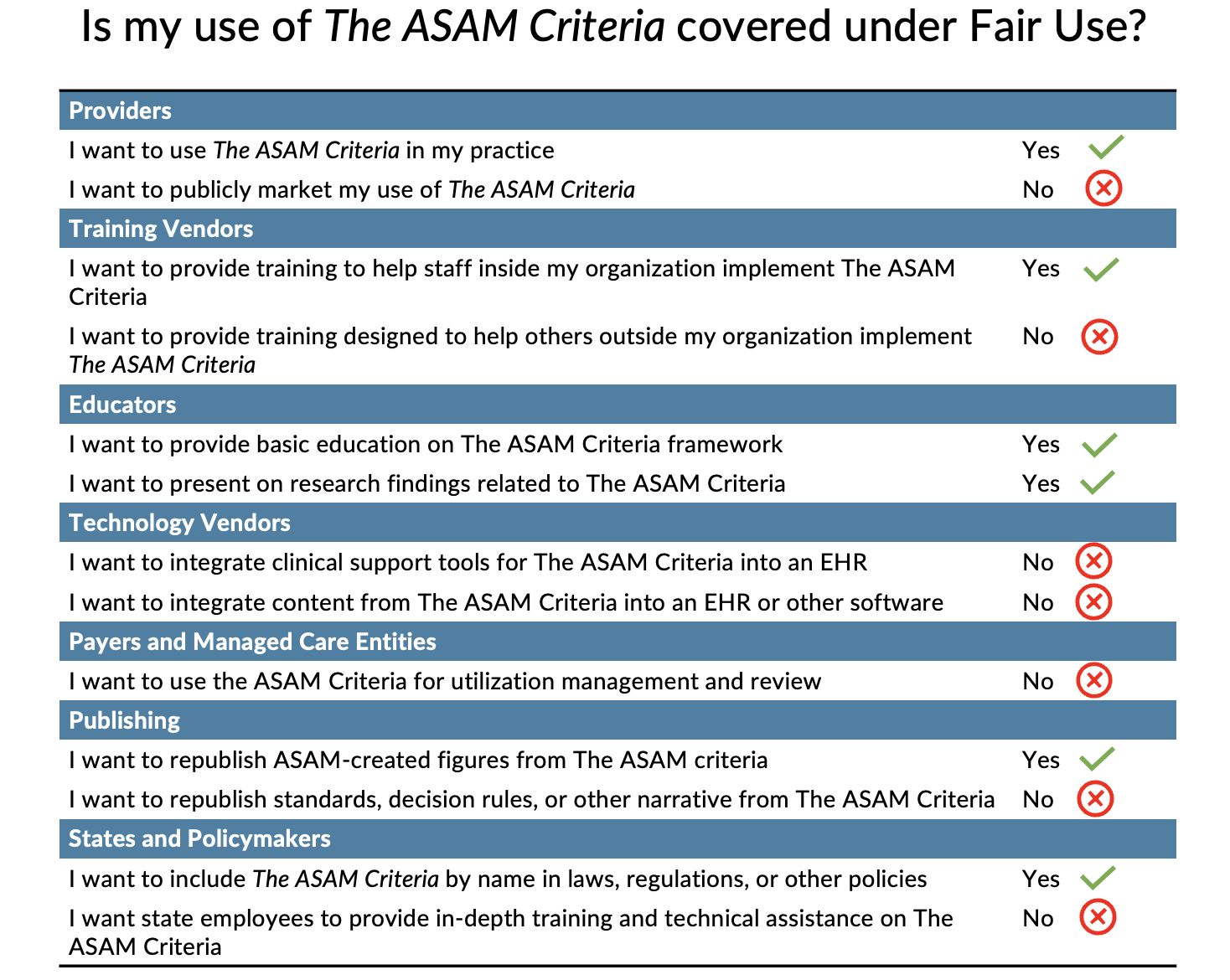The ASAM Criteria
About The ASAM Criteria
The ASAM Criteria is the most widely used and comprehensive set of standards for placement, continued service, and transfer of patients with addiction and co-occurring conditions.

What is The ASAM Criteria?
The ASAM Criteria is the most widely used and comprehensive set of standards for placement, continued service, and transfer of patients with addiction and co-occurring conditions. Formerly known as the ASAM patient placement criteria, The ASAM Criteria is the result of a collaboration that began in the 1980s to define one national set of criteria for providing outcome-oriented and results-based care in the treatment of addiction. Many states across the country are using The ASAM Criteria as the foundation of their efforts to improve the addiction treatment system.
Level of care recommendations and treatment plans are developed based on multidimensional patient assessments that consider the patient’s biomedical, psychological, and social needs.
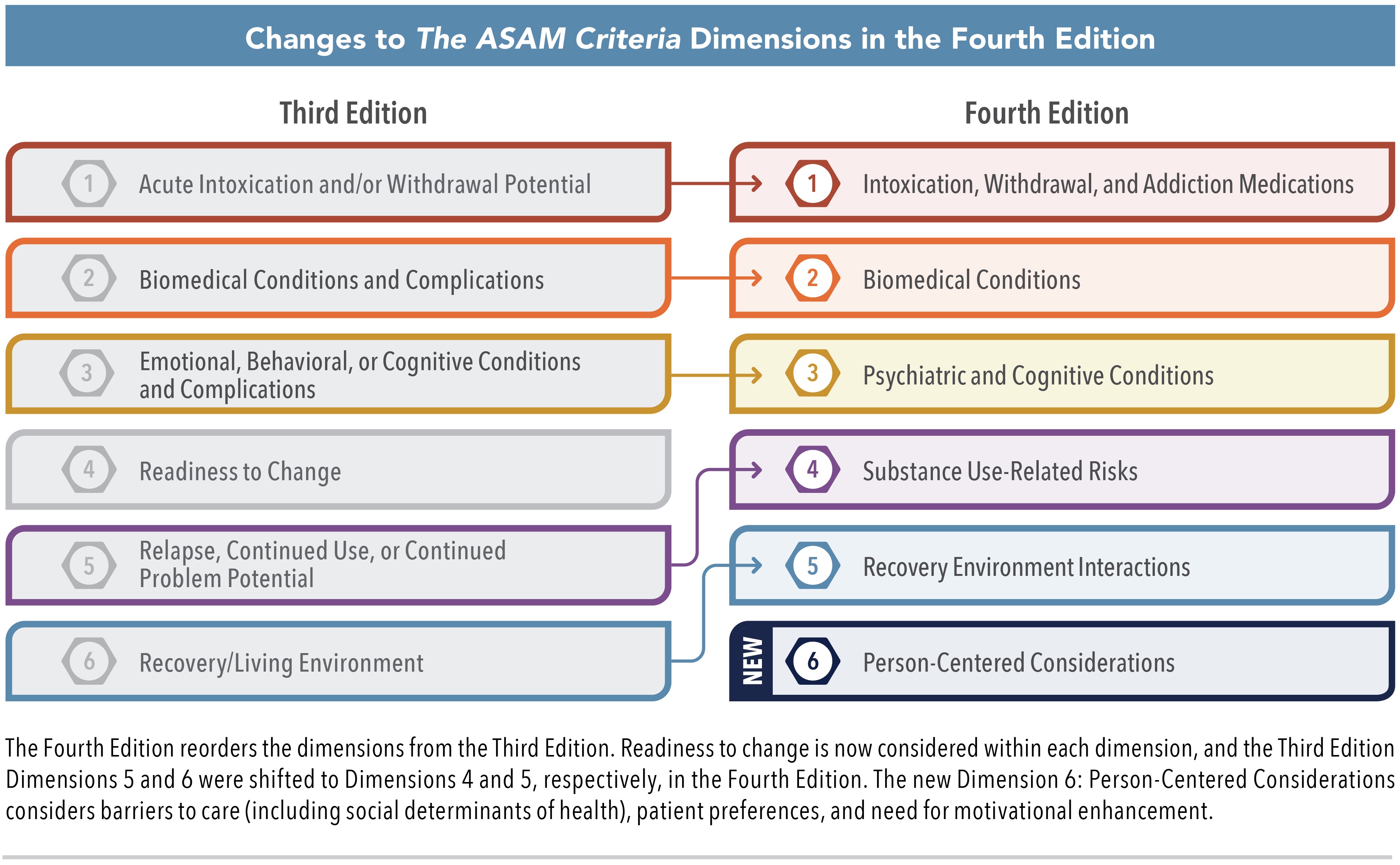
What are the Levels of Care?
The ASAM Criteria’s strength-based multidimensional assessment takes into account a patient's needs, obstacles and liabilities, as well as their strengths, assets, resources, and support structure. This information is used to determine the appropriate level of care across a continuum.
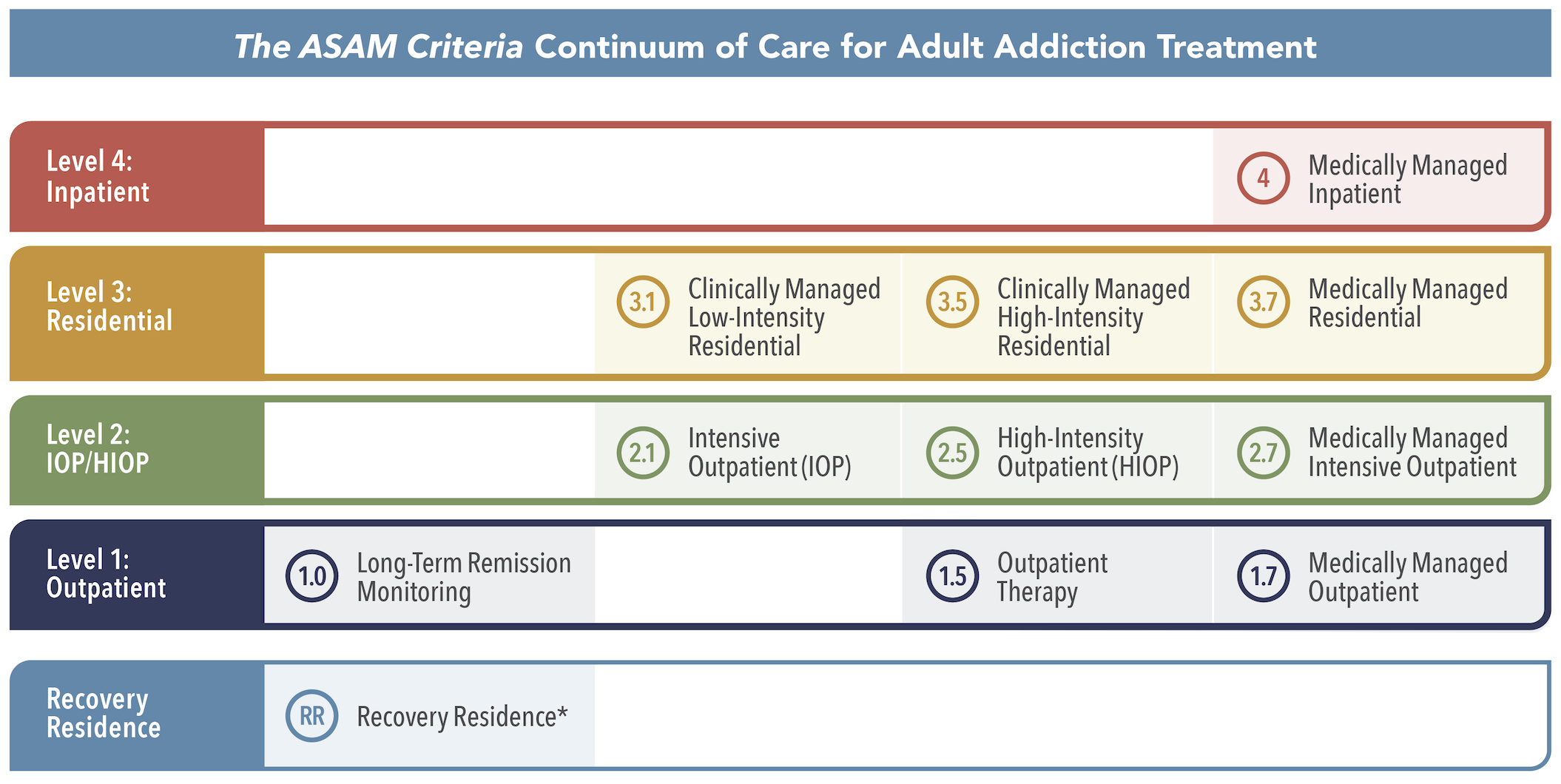
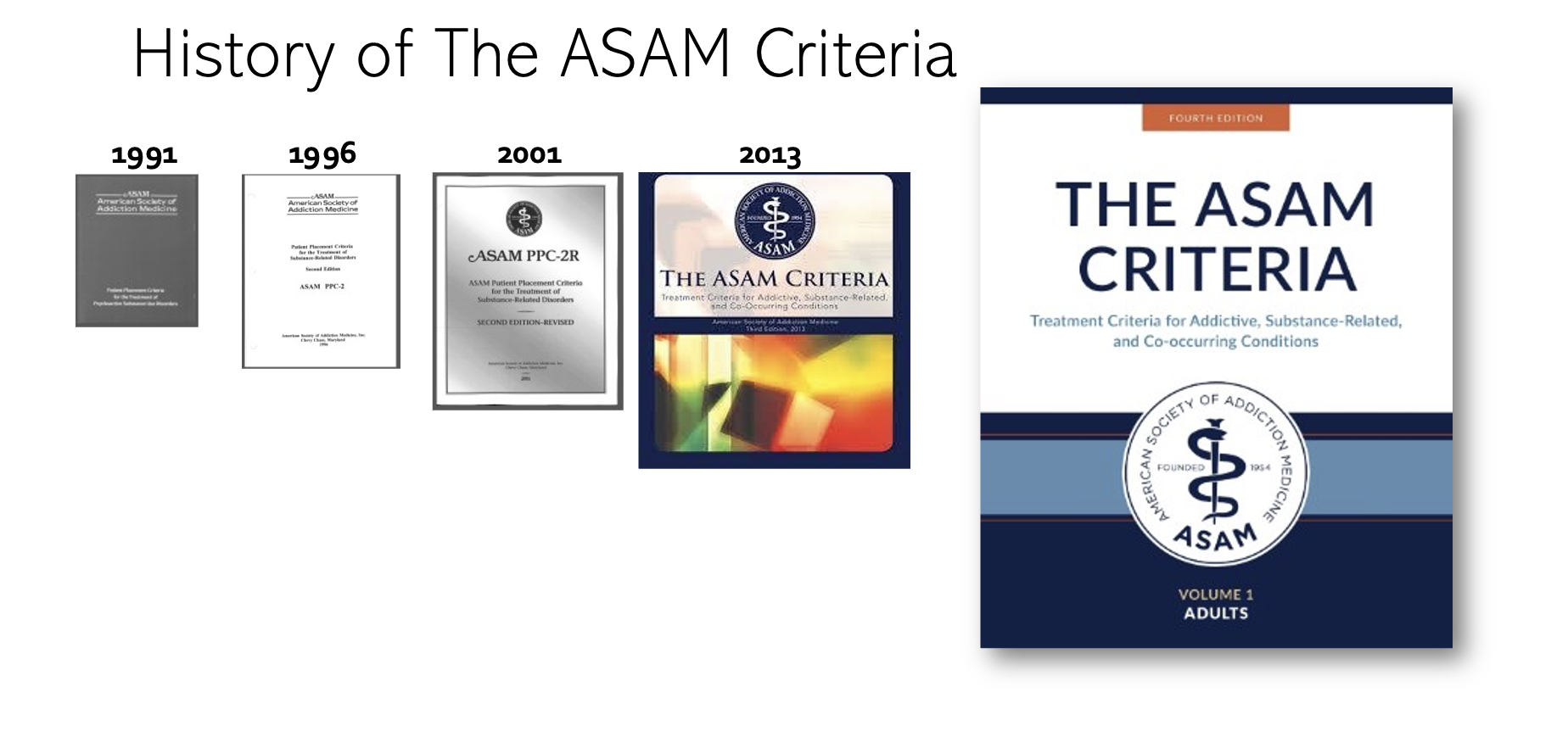
The ASAM Criteria began as a collaboration with both national and state organizations that was focused on developing one unified set of standards for determining patient admission, continued service, and transfer criteria. It was first published in 1991, then called the ASAM patient placement criteria. The name was updated in 2013 with the third edition. The 4th edition was released in 2023.
Who uses The ASAM Criteria?
The ASAM Criteria provides one common language for assessing patient needs and describes the continuum of addiction treatment care.
The ASAM Criteria provide a framework for organizing the addiction treatment system. Implementation requires coordination across clinicians, payors, and policy makers:
- Patients entering addiction treatment should receive a standard multidimensional assessment that covers all six dimensions described in The ASAM Criteria.
- The ASAM Criteria Dimensional Admission Criteria should be used to interpret the assessment and match the patient to the right level of care to meet their treatment needs.
- Payers and managed care organizations should use the same Dimensional Admission Criteria to determine what level of care will be covered for an individual patient.
- The treatment program should meet the service characteristic standards (eg, staffing, support systems, services, etc.) for the level(s) of care that they provide.
- The treatment system should provide access to all levels of care in The ASAM Criteria care continuum.
- Patient’s should be re-assessed regularly and the ASAM Criteria transition and continued service criteria should be applied as the patient progresses through treatment to determine when they should transition to another level of care (either more or less intensive depending on the individual’s progress and evolving needs).
- Healthcare providers and utilization review managers should be well-trained in The ASAM Criteria to support effective decision-making.
Clinicians
- Conduct comprehensive multidimensional assessments
- Make the appropriate level of care recommendations
- Work with the patient to identify goals and develop an individualized treatment plan
Policy Makers
- Use The ASAM Criteria® as the foundation of legislative, regulatory, and policy efforts to improve the addiction treatment system.
- See Speaking The Same Language: A Toolkit for Strengthening Patient-Centered Addiction Care in the United States for more information.
Payers
- With The ASAM Criteria, managed care organizations can easily work with clinicians to ensure plan participants are receiving the least intensive but safe and effective treatment.
- License The ASAM Criteria Dimensional Admission Criteria to apply as medical necessity criteria for plan participants. Please complete this form for more information.
Patients & Families
- Become active participants in their own care
- Learn about, anticipate, and understand treatment options
- Use The ASAM Criteria’s six dimensions, or life areas, to better understand how risks and strengths, skills and resources in one life area can affect another
- Access professional resources. Take a Free Brief Assessment to learn about what level of care might meet your needs. .
Oversight and Revision of The ASAM Criteria
Revisions to the criteria are led by The ASAM Criteria Editorial Team with oversight from ASAM’s ASAM Criteria Strategy Steering Committee, Quality Improvement Council and Board of Directors. The Coalition for National Clinical Criteria provides input throughout the process. The Coalition represents major stakeholders in addiction treatment and has been meeting regularly since the development of the first ASAM Patient Placement Criteria in 1991. The coalition addresses feedback and ensures that the Criteria adequately serves and supports the needs of the addiction treatment field. (A full roster of members and their affiliations are available upon request).
What is the evidence base for The ASAM Criteria?
The ASAM Criteria was built on a foundation of evidence around the multidimensional factors that influence disease severity and prognosis and expert consensus from a broad coalition of clinical stakeholders. See the methodology for the 4th Edition of the ASAM Criteria.
A growing body of research is evaluating real-world implementation of The ASAM Criteria. Please view our evidence page.
What uses of The ASAM Criteria require a licensing or permissions agreement, and what is covered under fair use?
ASAM uses permissions agreements to authorize the use of ASAM’s intellectual property. Permissions fall into four broad categories:
- Training vendors who provide training for implementing The ASAM Criteria
- Payers and managed care providers using The ASAM Criteria in utilization management and review
- Publishers republishing content from The ASAM Criteria
- Technology vendors integrating ASAM Criteria content into technology
